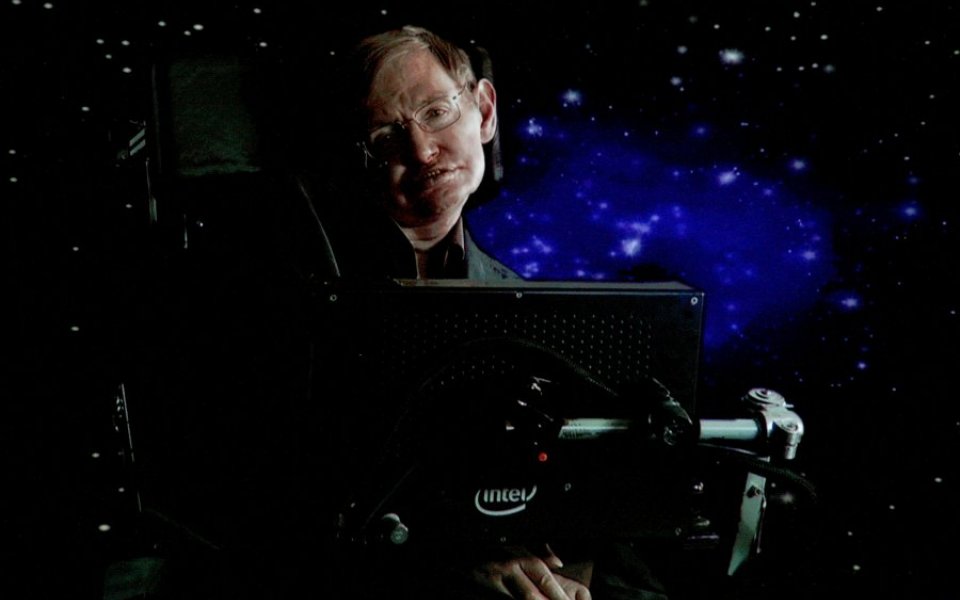Why does Stephen Hawking hate the future?

When it comes to modern day scientists none have managed to punch through into the collective psyche of our society more than Stephen Hawking.
From his incredible ambition to explain the theory of everything through to his brilliant performances (in all senses of the word) on comedy and primetime TV shows, he has become the key connection between the best understanding of how our universe works and what most normal humans are able to understand.
So why is it then, that he seems determined to paint such a bleak future of what may come to pass?
Last week, he hit the news basically explaining that we have somewhere between 100 and 10,000 years left before we completely mess things up and totally destroy our planet. (Although looking at some of the late night photos of the new year’s celebrations in towns around the UK earlier this month, some might be forgiven for thinking it may well come a little sooner.)
Stephen Hawking’s doom laden visions for the future are now becoming pretty common and a regular occurrence. Last year he hit the news again, this time spelling the end of human-kind based on the progression of artificial intelligence and its combination with military hardware.
Read more: Relax: Robot Godzilla won't enslave us all
Overall, the reasons behind our impending demise are simple – human ambition combined with human error – but the potential ways we will meet our fate cover a grim but broad spectrum of total destruction.
Science, it seems, brings with it many things and a variety of new ways to destroy ourselves are just part of the package. From nuclear mishaps, to autonomous weapons and genetic mutations, the list of our forthcoming demise grows with every new innovation.
All in all, if someone as bright as Stephen Hawking thinks there’s not much to look forward to, what hope do the rest of us have?
But here’s the really interesting thing about Hawking’s predictions, he’s not doing this because he’s pessimistic, bitter and twisted by the world at large. Perhaps bizarrely, it’s actually quite the opposite. He’s starting these conversations because he’s overtly optimistic about the future, or more specifically about humankind’s ability to overcome and evolve. All he’s really doing is just trying to get us to think about the things that will be important to us before it gets too late.
The fact that people like Hawking (and others such as Bill Gates and Elon Musk) are cautious about our potential future is a really good sign, because these are the people that best understand both the potential use, and mis-use, of the various technologies that will ultimately lie at the heart of our society.
Many of these technologies are being created and used today in our everyday life and as such we all have a duty of care to understand how they work and the implications they may bring to all of us. This is not just a debate for the scientists, the geeks and the politicians, it is for all of us to engage. The real trick, however, is that we cannot judge the potential of any new technology by today’s standards. Instead we have to get a lot better at envisioning the future in order to better understand the potential in a world that has evolved from where we are today.
Read more: AI "alarmists" Hawking and Musk win 2015 Luddite Award
It’s a bit like how odd it felt 20 years ago when someone suggested putting a camera in our mobile phones. I remember thinking “brilliant, now I have a rubbish camera and a less useful phone” completely missing the future potential of such a technological combination. Back then, even I was guilty of judging things by the past precedent not the future potential, and as such, wasn’t able to envisage a world where I could use that same camera to instantly translate languages, or bring augmented reality entertainment into the palm of my hand.
Hawking’s warnings are a crucial part of our evolution as a race, warning us to do things today that will either minimise the risk or at least give us alternative options. He is a vast proponent of seeking out a new home somewhere else in the galaxy and thinks that within 100 years we will at least have a back-up plan should things not quite turn out like we’d planned.
When I was a kid, my mum always used to tell me that “whatever you end up doing, always make sure you have enough money for the bus fare home”. And in reality, this is all Hawking is trying to do for us today. He just wants us to think about how all of this might turn out and to plan our actions such that they leave us the best possible chance for our success and our safety.
The real trick I suspect is that it’s going to be a bit more complicated and a lot more expensive than getting the number six bus home from the town centre. But overall, I’m inclined to agree with him – I think we’re more than up for it, if only we can get that conversation started.